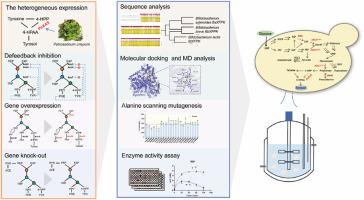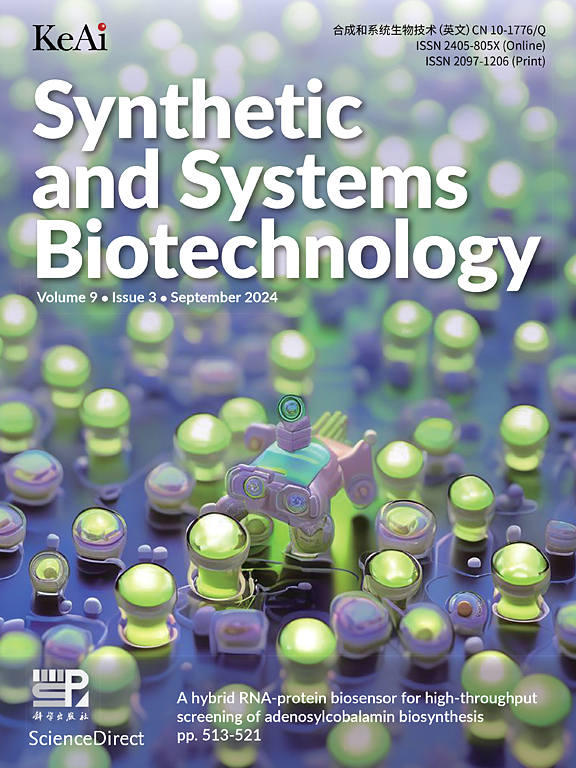Semi-rational design and modification of phosphoketolase to improve the yield of tyrosol in Saccharomyces cerevisiae
IF 4.4
2区 生物学
Q1 BIOTECHNOLOGY & APPLIED MICROBIOLOGY
引用次数: 0
Abstract
Tyrosol is an important component of pharmaceuticals, nutraceuticals, and cosmetics, and their biosynthetic pathways are currently a hot research topic. d-Erythrose 4-phosphate is a key precursor for the biosynthesis of tyrosol in Saccharomyces cerevisiae. Hence, the flux of d-Erythrose 4-phosphate determined the yield of tyrosol synthesis. In this study, we first obtained an S. cerevisiae strain S19 with a tyrosol yield of 247.66 mg/L by metabolic engineering strategy. To increase the production of d-Erythrose 4-phosphate, highly active phosphoketolase BA-C was obtained by bioinformatics combined with tyrosol yield assay. The key residue sites 183, 217, and 320 were obtained by molecular docking, kinetic simulation, and tyrosol yield verification. After mutation, the highly efficient phosphoketolase BA-CHis320Met was obtained, with a 37.32 % increase in enzyme activity. The tyrosol production of strain S26 with BA-CHis320Arg increased by 43.05 % than strain S25 with BA-C and increased by 151.19 % compared with the strain S19 without phosphoketolase in a 20 L fermenter. The mining and modification of phosphoketolase will provide strong support for the de novo synthesis of aromatic compounds.

半合理设计和修饰磷酸酮醇酶以提高酿酒酵母酪醇的产率
Tyrosol是药品、保健品和化妆品的重要成分,其生物合成途径是目前研究的热点。d- 4-磷酸红酶是酿酒酵母生物合成酪醇的关键前体。因此,d- 4-磷酸红酶的通量决定了酪醇合成的产率。在本研究中,我们首先通过代谢工程策略获得了一株酿酒葡萄球菌S19,其酪醇产量为247.66 mg/L。为了提高d- 4-磷酸红酶的产量,生物信息学结合酪醇产率测定获得了高活性的磷酸酮醇酶BA-C。通过分子对接、动力学模拟和酪醇产率验证得到了关键残基位点183、217和320。突变后获得了高效磷酸酮酶BA-CHis320Met,酶活性提高了37.32%。在20 L发酵罐中,添加BA-CHis320Arg的菌株S26的酪醇产量比添加BA-C的菌株S25提高了43.05%,比不添加磷酸酮醇酶的菌株S19提高了151.19%。磷酸酮醇酶的挖掘和改性将为芳香族化合物的新合成提供有力的支持。
本文章由计算机程序翻译,如有差异,请以英文原文为准。
求助全文
约1分钟内获得全文
求助全文
来源期刊

Synthetic and Systems Biotechnology
BIOTECHNOLOGY & APPLIED MICROBIOLOGY-
CiteScore
6.90
自引率
12.50%
发文量
90
审稿时长
67 days
期刊介绍:
Synthetic and Systems Biotechnology aims to promote the communication of original research in synthetic and systems biology, with strong emphasis on applications towards biotechnology. This journal is a quarterly peer-reviewed journal led by Editor-in-Chief Lixin Zhang. The journal publishes high-quality research; focusing on integrative approaches to enable the understanding and design of biological systems, and research to develop the application of systems and synthetic biology to natural systems. This journal will publish Articles, Short notes, Methods, Mini Reviews, Commentary and Conference reviews.
 求助内容:
求助内容: 应助结果提醒方式:
应助结果提醒方式:


